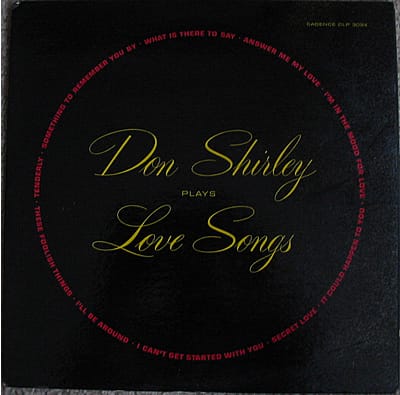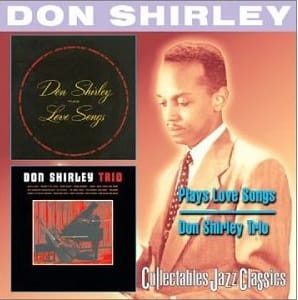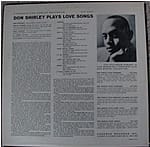 |
 |
 |
 |
Don
Shirley - Love Songs
Cadence
CLP3034 [1960] |

IGOR STRAVINSKY: "His virtuosity is worthy of Gods."
BENTLEY STEGNER, Chicago Sun·Times: "He can play big
round notes that fall as softly as velvet, or make
bright, little ones leap up like the tinkle of ice
in a glass."
SARAH VAUGHAN: "The most glorious sense of shading,
phrasing and balance I've ever heard."
AL "JAZZBO" COLLINS: " ... of all the things that
might be consigned him, he is most nearly to become
the artist embodying the suffusion of the classics
and the modern.•." |
1. Tenderly - Don Shirley, Gross, Walter
2. Something to Remember You By - Don Shirley, Schwartz, Arthur
3. What Is There to Say? - Don Shirley, Duke, Vernon
4. Answer Me, My Love - Don Shirley, Winkler, Gerhard
5. I'm in the Mood for Love - Don Shirley, McHugh, Jimmy
6. These Foolish Things - Don Shirley, Link, Harry
7. I'll Be Around - Don Shirley, Wilder, Alec
8. I Can't Get Started - Don Shirley, Duke, Vernon
9. Secret Love - Don Shirley, Webster, Paul Franc
10. It Could Happen to You - Don Shirley, Burke, Johnny
Reissued on
Collectable Jazz Classics
COL2758

|

It is impossible to describe Don Shirley's music
without analyzing Don himself; and in analyzing, we
tend to categorize because we then have a ready
frame of reference. Although our age may not have
produced the Renaissance Man, Don Shirley probably
comes as close as any other human being in our time
to that ideal. His musical talents could almost be
overlooked from an academic standpoint if one
realizes that, in addition to his Doctorate in
Music, he is the holder of Doctorates in Psychology
and Liturgical Arts, speaks eight languages
fluently, and is considered an expert painter as
well.
Like most musicians who
are true innovators, Don Shirley the
arranger-composer has always been classified in
various pigeonholes such as "Jazz," "Classical,"
"Jazz-oriented Classical" or "Classically-oriented
Jazz," but always half-heartedly and with many
reservations. His work cannot be catalogued in a
particular school of musical composition. Each song
is more than just a new arrangement; it is a
composition in itself, using the familiar song
melody as part of its framework. Though the melodic
and harmonic structure of a song by Jimmy McHugh may
suggest to Don Nineteenth Century romanticism and
not Twentieth Century Hollywood, the melody is
always there forming the basic fabric of his
arrangement, at the same time inspiring
counter-melodies.
Don's piano style
reflects many different influences, yet these are
all governed by his own inscrutable and unyielding
individuality. He may suddenly quote the familiar
style of Garner or Ellington or Shearing. Still
these polite tributes are never more than just that,
for this is one more device of Don's using his music
to create the atmosphere he chooses. "There are
three ways to enjoy or to interpret music, from a
listening point of view: emotionally,
intellectually, and a combination of the two. I have
tried to utilize all three, contingent upon the
quality of the tune chosen." His choice of using the
piano as a stringed rather than as a percussion
instrument gives him a flexible and marvelously
expressive voice to combine emotion and intellect in
the subtlest way.
The extent of Don's
formal training is clearly revealed in his fabulous
technic. He began playing piano at the age of 2½
and by the time he was 9 he had been invited to
study at the Leningrad Conservatory, where he was to
spend a great part of his youth. And yet he was to
abandon the piano while still quite young.
It was while in Chicago
as a psychologist that Don "tripped" back into a
musical career. He was given a grant to study the
relationship, if any, between music and a juvenile
crime wave which had suddenly broken out in the
early 1950's. Working in a small club there, he used
his knowledge and skill to perform experiments in
sound, whereby he proved that certain tonal
combinations affected the audience's reactions. No
one in the audience knew of his experiment, or that
students had been planted among them to gauge their
reactions.
But Don Shirley the
pianist became a sensation. Appearances in New York
followed, notably at the Basin Street, where Duke
Ellington first heard him. Here started their warm
friendship which was highlighted by Don's
performance in 1955 of the premiere of the Duke's
Piano Concerto at Carnegie Hall with the NBC
Symphony of the Air. An appearance on the Arthur
Godfrey Show launched his career nationwide.
Don has composed three
symphonies, two piano concerti, a cello concerto,
three string quartets, a one-act opera, works for
organ, piano and violin, a symphonic tone poem based
on "Finnegan's Wake" and a set of "Variations" on
the legend of Orpheus in the Underworld.
All indications seem to
be that Don Shirley's favorite career is that of
musician, and his material that of our country, our
time, and the richness of a many-faceted
personality.
Instructor Donald Shirley once commented to a class
that "geography has no priority on human nature." In
this album Don unintentionally extends this thought
to the universal duet of love and music. The
listener finds influences that range from French to
German, from Polish to African, and from Russian to
very, very American.
Don calls upon a musical
heritage whose roots extend from the Blues of a
Bessie Smith or a Big Mae Belle (What Is There To
Say), to a litany-like ancient French Aube (Secret
Love), and a Chopin form of the Chant Polonaise (It
Could Happen To You.)
In I'm In The Mood For
Love, the young artist employs a harmonic structure
reminiscent of Schumann and Mendelssohn. The
rhythmical figure of the accompaniment-a constant
use of the first inversion-is characteristic of the
nineteenth century Lieder.
These Foolish Things
offers Don an opportunity to display his mastery of
free rhythm, a form associated with the Gregorian
Chant. The listener hears an ageing woman reflect on
the golden pleasures of the past, and senses that
here Don purposely avoids the inhibiting effect of a
rigid meter-hence the free rhythm, ·the tremolo of
nostalgia on both basses, and the constant use of
pedal point.
The arrangement of I
Can't Get Started With You was written after Don
saw James Dean in East of Eden. The music
softly states the woes of groping youth, building to
a crescendo of emotional intensity which is finally
broken with a fist-smashing anguish of resolution
and resignation. The keen ear will note a touch of
Rachmaninoff melancholy in the middle section.
Within the unexpectedly
bold, masculine chords of Tenderly is a
mastery of harmonic technique. In the simple melodic
line you will hear brilliantly employed the
principles of progression and resolution. Note the
direction of motion--contrary, as well as the
difficult oblique.
In this album we hear
true magic of musical communication--lyrics with a
clarity and sensitivity that make one feel he has
never really heard them before. "Music is the voice
of love," wrote Sincfair Lewis. He could not have
anticipated such an articulate spokesman. |
TENDERLY
Recorded at Bob Blake StudiOS, New York, July 19,
1956, Bass: Richard Davis
SOMETHING TO REMEMBER YOU BY
Recorded at Capitol Studios, New York July 15, 1957
WHAT IS THERE TO SAY
Recorded at Bob Blake Studios, New York July 19,
1956 Bass: Richard Davis
ANSWER ME MY LOVE
Recorded at Webster Hall, New York, May 7,1955,
Bass: Richard Davis
I'M IN THE MOOD FOR LOVE
Recorded at Capitol Studios, New York July 15, 1957
THESE FOOLISH THINGS
Recorded at Capitol Studios, New York October 21,
1957 Basses: Jim Bond and Kenneth Fricker
I'LL BE AROUND
Recorded at Capitol Studios, New York July 15, 1957
I CAN'T GET STARTED WITH YOU
Recorded at Webster Hall, New York, December 20,
1955, Bass: Richard Davis
SECRET LOVE
Recorded at Webster Hall, New York, May 7,1955,
Bass: Richard Davis
IT COULD HAPPEN TO YOU
Recorded at Capitol Studios, New York, July 15, 1957 |
|
|
|

